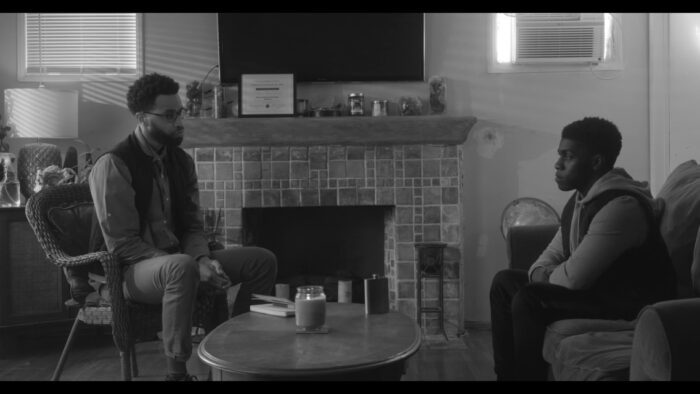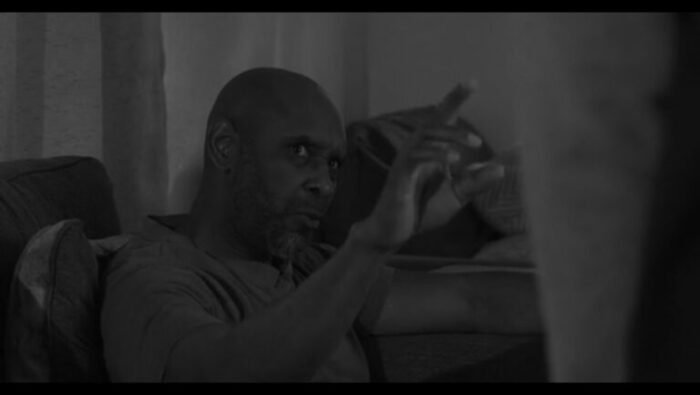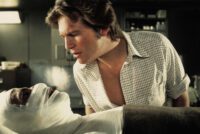Channeling the L.A. Rebellion films of Charles Burnett, the feature debut film from Los Angeles-based writer-director Marcellus Cox, Mickey Hardaway takes on the cyclical patterns of domestic abuse and the challenge of Black masculinity in a thought-provoking drama. Having just completed a successful run on the festival circuit, Cox’s film will release digitally this month on Prime Video, Apple TV, and other streaming services. Mickey Hardaway, named for the film’s young protagonist, expands on the director’s prior short by the same name to tell the story of a young man in therapy whose sessions force him to examine the years of abuse he encountered at the hands of his father.
Mickey, played by Rashad Hunter, is devoted to his art but struggling to gain economic independence in a competitive industry. His sympathetic girlfriend Grace (Ashley Parchment) encourages him to seek the counsel of therapist Dr. Cameron Harden (Stephen Cofield Jr.), sessions which attend to his childhood experiences as a young boy growing up with his physically and verbally abusive ex-ballplayer father (David Chattam) and enabling mother (Gayla Johnson), a difficult childhood made bearable only by the mentorship of a caring art teacher, Mr. Sweeney (Dennis LA White).

In flashback scenes, young Mickey (played by Blake Hezekiah) suffers his father’s cruel abuse for no reason other than his love of art, an avocation the elder Hardaway, a former athlete, finds offensively un-masculine. But the young boy, with his teacher’s encouragement, grows into a thoughtful, contemplative man able to stand up to his abusive father. Though the scenes of abuse are adroitly directed, they’re no less challenging to watch as the abusive father rains down blows on the defenseless boy. Domestic violence is often cyclical, one generation teaching the next the tactics of abuse: one wonders what the impact of his father’s violence will be on Mickey as he matures.
In the film’s present, even as a young, newly independent man trying to earn a living, Mickey bears the sting of his long childhood abuse. He loves his art but cannot trust others, and too often he seeks solace in a bottle—the seeds of a problem his astute girlfriend is quick to observe. In adulthood, the challenge of finding an outlet for his art continues, leading him to a potential business deal with a powerful editor (Samuel Whitehill) with an agenda of his own. Caught between the violence learned from his father and the guidance of his therapist, girlfriend, and mentor, Mickey finds himself confronted with a new kind of evil that represents a centuries-long appropriation of Black artistry.
Made for just $30,000, Cox’s debut feature has a lot going for it. Its script, if occasionally more talk than show, plots a young and plausible protagonist against conflicts, both internal and external, grounded in the conceit of the therapy sessions that motivate the film’s excellent flashbacks. Whether viewers find in Mickey’s childhood and present sufficient motivation for the violence that explodes in the film’s final act is open to question, but as the protagonist, Rashad Hunter brings a simmering resolve to the role: he is a young man committed to improving himself and his circumstance, even if “the powers that be” may be too much to overcome.
Hunter’s is not the only excellent performance. As the abusive father ruing a lost chance at sports stardom, David Chattam is convincingly persuasive, his penchant for violence ready to boil at any perceived slight or challenge. The supporting cast—Stephen Cofield Jr and Dennis LA White as Mickey’s role models Dr. Harden and Mr. Sweeney, respectively, and with less screen time Ashley Parchment as Mickey’s girlfriend Grace and Gayla Johnson as his mother—are all strong. Somewhat less convincing are the scenes with the conniving editor that don’t quite convey the gravitas the role demands, given their centrality to the film’s final act. All in all, the performances ground Mickey Hardaway in a genuine contemporary realism.

The film’s cinematography is also a strength. In a handsome black and white with some occasionally elegant movement and inventive framing, Jamil Gooding’s camerawork makes for a film with a distinct and highly effective aesthetic—especially on such a short dime. The sets are simple but with only a few exceptions highly effective. A brief episode of color mid-film has its own style every bit the equal of the rest of the film, a gauzy, breezy, Kodachrome-inspired sequence interrupting the film’s otherwise stark reality. The sound recording is occasionally a little less effective in some of the dialogue sequences, but in all, and especially on its tight budget, Mickey Hardaway is an excellent example of making the most with what one has.
A convincing portrait of a young man whose influences and experiences cannot, it seems, help but turn him into his own worst enemy, despite the mentorship and relationships he seeks, Mickey Hardaway manages to tell a new-but-familiar story from the hood of L.A. and with the same zeal for truth Charles Burnett sought decades ago with films like Killer of Sheep and My Brother’s Wedding. (It shares, in some respects, narrative ties with the recently released Canadian drama Brother.) It deserves the wider audiences its VOD debut will provide it, and I hope, director-writer Marcellus Cox the opportunity to direct more films with more resources in the very near future.
Written and directed by Marcellus Cox and starring Rashad Hunter, Ashley Parchment, Stephen Cofield Jr, David Chattam, Dennis LA White, Gayla Johnson, and Samuel Whitehill, Mickey Hardaway is available to stream from Indie Rights on most major streaming services.




